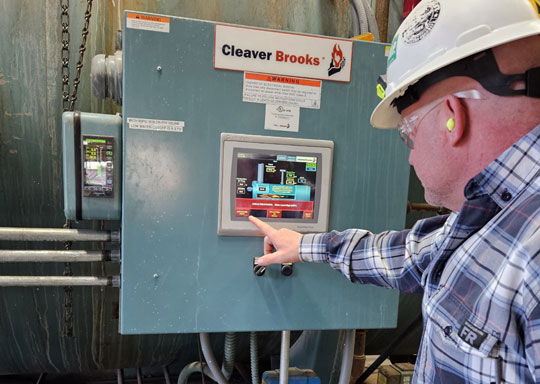
Stationary Engineer vs. Boiler Operator: What’s the Difference?
If you’re mechanically inclined and enjoy working with equipment, a career as a stationary engineer or boiler operator might be right up your alley. Both roles play a vital part in keeping commercial and industrial buildings running safely and efficiently—but how do they differ, and what do they have in common?
Let’s explore the similarities and differences between these two important careers, along with everything you need to know about getting started in either field.
At a Glance: Stationary Engineer vs. Boiler Operator
Here’s a side-by-side comparison of the two roles:
| Feature | Stationary Engineer | Boiler Operator |
| Primary Focus | Operates and maintains stationary mechanical equipment (boilers, turbines, HVAC, etc.) | Operates and maintains boilers and auxiliary equipment |
| Work Environment | Large facilities: hospitals, factories, schools, malls, apartment complexes, etc. | Industrial facilities, hospitals, utility companies, commercial buildings |
| Key Responsibilities | Monitoring gauges, maintaining equipment, supervising systems, testing, repairs | Monitoring water pressure and temperature, testing water quality, replacing parts |
| Required Education | High school diploma or GED, vocational training, apprenticeships, community college | High school diploma or GED, apprenticeship, technical diploma or associate’s degree |
| Licensure | Often required depending on state and equipment | Often required, varies by state and boiler type |
| Median Salary In USA | $125,000 per year | $70,856 per year |
| Job Outlook | 2% growth expected (2019–2029) | 4% growth expected (2021–2031) |
| Core Skills | Mechanical skills, attention to detail, communication, endurance, coordination | Technology skills, dexterity, communication, problem-solving, proactiveness |
What Is a Stationary Engineer?
Stationary engineers are professionals who repair and maintain mechanical equipment to help buildings and facilities operate effectively. They work with stationary equipment such as:
- Boilers
- Turbines
- Heating and cooling systems
- Ventilation equipment
- Motors and compressors
You’ll find them in warehouses, schools, shopping malls, hospitals, apartment buildings, industrial plants, and more. They’re responsible for ensuring these systems run safely and efficiently. Depending on the size of the facility, they may either perform all tasks themselves or manage a team of assistants and technicians.
Common Duties:
- Operating and adjusting equipment
- Monitoring fuel, water, and air levels
- Inspecting machinery for wear and damage
- Conducting tests and creating equipment logs
- Coordinating with other professionals
Skills Needed:
- Attention to detail
- Mechanical knowledge
- Problem-solving ability
- Physical endurance
- Coordination and teamwork
Education & Training:
Most stationary engineers begin with a high school diploma or GED, followed by vocational training, apprenticeships, or associate degrees in mechanical or stationary engineering. Licensing requirements vary by state but often involve passing a written exam and logging on-the-job experience.
What Is a Boiler Operator?
Boiler operators focus specifically on boilers and auxiliary systems that produce steam or hot water for heating or power generation. They ensure that boilers are functioning safely and efficiently by monitoring pressure and temperature levels, conducting maintenance, and testing water quality.
Where They Work:
- Industrial facilities
- Hospitals
- Utility companies
- Large commercial buildings
Common Duties:
- Monitoring gauges and controls
- Inspecting boilers and related systems
- Replacing or repairing damaged parts
- Ensuring proper water chemistry
- Cleaning and maintaining boiler rooms
- Reading blueprints and technical manuals
Skills Needed:
- Technology proficiency
- Dexterity and precision
- Strong communication
- Problem-solving
- Proactive safety mindset
How to Become One:
- Earn a high school diploma or GED.
- Complete an apprenticeship program or technical diploma in power engineering.
- Obtain state-specific licensure if required.
- Gain full-time employment in commercial or industrial settings.
- Continue professional development and renew licenses as needed.
Career Outlook & Salary
The Bureau of Labor Statistics projects a 2% job growth for stationary engineers and a 4% growth for boiler operators over the next several years. As long as facilities rely on complex heating and power systems, the demand for skilled operators and engineers will remain steady. Learn more about the salary guidelines by viewing our 2025 outlook guide.
Which Path Is Right for You?
If you’re fascinated by mechanical systems and want variety in the types of equipment you work on, a career as a stationary engineer might suit you best. If you enjoy focused, hands-on work with boilers and want to become a specialist in that area, becoming a boiler operator could be the perfect fit.
Both professions offer:
- Long-term career stability
- Opportunities for advancement
- Strong earning potential
- In-demand technical skills
Whichever path you choose, you’ll play a crucial role in keeping essential building systems safe and running smoothly.
Need help preparing your resume or looking for job opportunities in this field? Check out listings on our job board or speak to a local trade school for more guidance on apprenticeships and licensing by visiting are online educational resource guide.